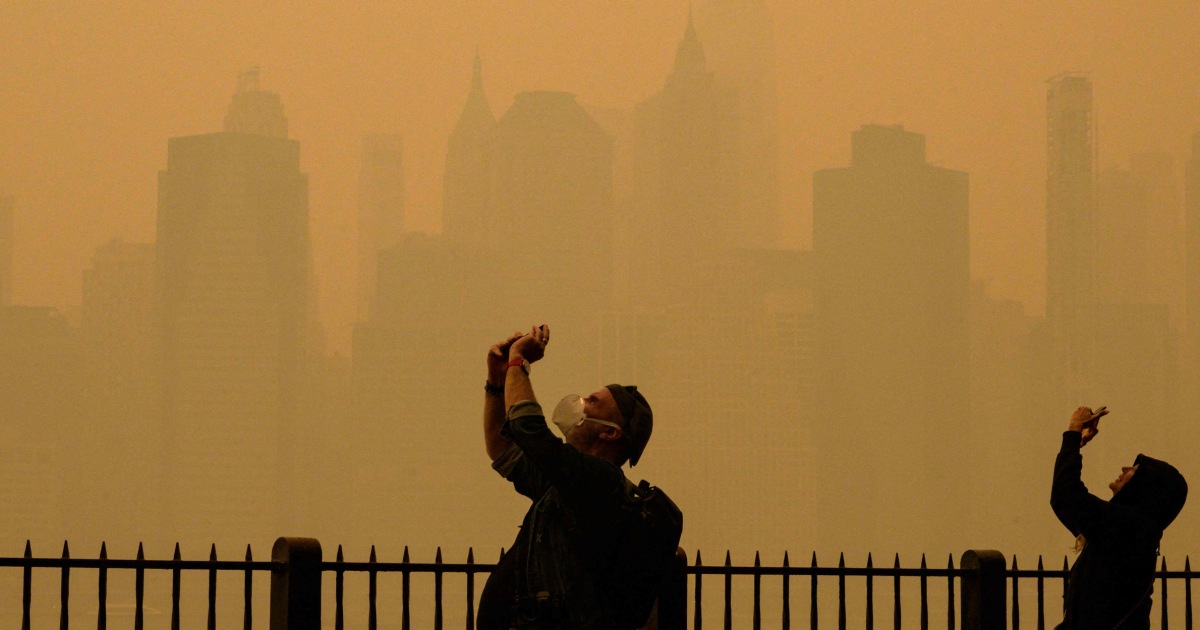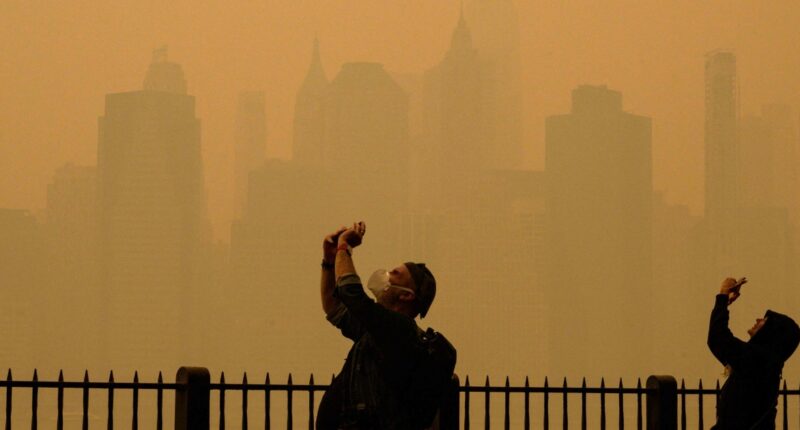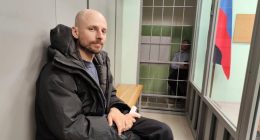
During the crisis, New York state and city officials did communicate many of the messages experts say are best, about staying inside and seeking cleaner air. They shuttered outdoor events as visibility declined and health risks skyrocketed.
After New York City sent its first notifications about smoke, Mayor Eric Adams said Tuesday he went outside and realized the city was dealing with something novel and brutally unpleasant.
“It wasn’t until I went outdoors and basically said, ‘What the hell is this?’” Adams said at a news conference when reporters asked him when he realized the smoke was a bigger problem. “It was clear there was something different that was happening in the city.”
New York City’s emergency planning documents and website, which are designed to assess all the hazards that could affect the city, have few mentions of wildfire smoke.
Zachary Iscol, the commissioner of NYC Emergency Management, said at a news conference Tuesday that the agency was working to develop triggers for smoke and other climate impacts.
“The other types of weather events where we have an off-the-shelf plan, that leads to certain specific actions. So that’s something that we are now developing,” he said.
In a statement to NBC News, NYC Emergency Management said its existing emergency plans are “scalable and flexible” to a variety of hazards, including the recent air quality emergency. The agency said that it was hosting multiple interagency calls every day to address the hazard, that it had sent notices about smoke through Notify NYC, its emergency notification system, and that other city agencies had distributed high-quality masks.
Unexpected climate impacts have stung unprepared cities.
Seattle did not have a specific plan for heat waves in June 2021, when temperatures soared to 108, 5 degrees hotter than its previous record, in an event scientists later said would have been “virtually impossible” without the influence of climate change. The city was not ready for heat: Just two of its community centers had air conditioning, and only 20% of its drinking fountains — turned off during Covid — were operational on the first day of extreme temperatures. City leaders later said they did not have a sufficient plan to help older residents. A historic number of medical and fire calls challenged first responders and overwhelmed local emergency departments.
Smoke-filled summers on the West Coast have pushed officials to revamp their emergency planning processes to contend with days of unhealthy or hazardous smoke.
In the Portland area, tormented by oppressive smoke in 2020, among other years, officials have developed a playbook shared across local agencies that outlines specific actions to take, triggered by air quality index measures. Oregon officials have adopted a similar set of measures.
Before smoke season, which typically starts in late summer in the Pacific Northwest, health officials mount a weeklong campaign called “Smoke Ready Week,” which urges residents to buy mechanical air filtration systems and develop clean air spaces within their homes, said Andrea Hamberg, the director of environmental health services at the Health Department in Multnomah County, which includes Portland. Throughout the year, the state and the county work to distribute air cleaning devices to low-income residents.
The playbook has several thresholds for AQI that trigger specific health guidance and actions across city and county departments, Hamberg said. During prolonged smoke events, the city and the county will open cleaner air centers — public spaces with air filtration designed to give people a break from the smoke.
The county keeps a list of public buildings equipped with air scrubbers, Hamberg said. It also keeps a limited amount of supplies on hand to help people construct do-it-yourself air filtration boxes when smoke strikes.
During “very unhealthy” air events — which have happened twice in the Portland area — officials will cancel all outdoor events, recommend that people shelter in place and keep students at home, Hamberg said.
There are also laws to address smoke risks faced by workers.
Oregon legislators passed a law in 2021 requiring stringent workplace rules for smoke events. Employers must provide N95-quality respirators for employees’ voluntary use when AQI measures exceed 100 — levels considered “unhealthy for sensitive groups.” Respirators are required when the AQI hits 251, or “very unhealthy.”
The rules require communication with employees about smoke and to relocate workers indoors and change their schedules during poor air quality days. Washington and California have adopted similar measures.
New York state has no law to govern workers’ exposures specifically to wildfire smoke, said Marina Jabsky, a policy expert with the New York Committee for Occupational Safety and Health.
Kevin Riley, the director of UCLA’s Labor Occupational Health & Safety program, said he was not aware of any states apart from Washington, Oregon and California that have specific smoke protections for workers.
The conditions that brought smoke to the eastern U.S. are becoming increasingly common because of climate change and historical policies of fire suppression in North America.
A decade ago, less than half a million people in the U.S. lived in areas that experienced unhealthy levels of wildfire smoke for at least a day. In research last year, Burke and other researchers found the number had risen to more than 8 million.
The Clean Air Act and other legislation have made marked improvements in industrial and tailpipe pollution in the U.S., which has dramatically boosted overall air quality. Now, wildfire smoke — which is not regulated by the act — is reversing that progress in parts of the country.
Source: | This article originally belongs to Nbcnews.com










